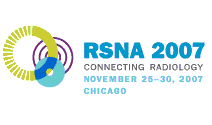
Abstract Archives of the RSNA, 2007
Bruce E. Hillner MD, Presenter: Nothing to Disclose
Barry A. Siegel MD, Abstract Co-Author: Medical Advisory Board, Radiology Corporation of America
Speaker, Radiology Corporation of America
Stockholder, Radiology Corporation of America
Medical Advisory Board, Spectrum Dynamics Ltd
Speaker, DMS Health Group
Speaker, Siemens AG
Speaker, Cardinal Health, Inc
Consulting, Tyco Healthcare (Mallinckrodt Inc)
R. Edward Coleman MD, Abstract Co-Author: Research grant, General Electric Company
Consultant, General Electric Company
Speakers Bureau, Siemens AG
Medical Advisory Board, Radiology Corporation of America
Stockholder, Radiology Corporation of America
Speakers Bureau, Radiology Corporation of America
Speakers Bureau, Alliance Imaging, Inc
Anthony Shields MD, PhD, Abstract Co-Author: Consultant, Genentech, Inc
Stockholder, Radiology Corporation of America
Consultant, Radiology Corporation of America
Consultant, Nascent Pharmaceuticals, Inc
Research support, Nascent Pharmaceuticals, Inc
Research support, Novartis AG
Research support, AstraZeneca PLC
Research support, Amgen Inc
Research support, Pfizer Inc
Ilana F. Gareen PhD, Abstract Co-Author: Nothing to Disclose
Lucy Hanna MS, Abstract Co-Author: Nothing to Disclose
Sharon Hartson Stine, Abstract Co-Author: Nothing to Disclose
Dawei Liu PhD, Abstract Co-Author: Nothing to Disclose
et al, Abstract Co-Author: Nothing to Disclose
et al, Abstract Co-Author: Nothing to Disclose
The National Oncologic PET Registry (NOPR) was designed to meet the data collection requirements necessary for Medicare coverage of positron emission tomography (PET) for previously non-covered cancer types and indications. This report describes the impact of PET with F-18 fluorodeoxyglucose on physicians’ intended management based on data from the first seven months of NOPR operation to December 31, 2006.
The NOPR design and analysis plan are outlined in a companion paper. The cohort analyzed consisted of data for 16,292 PET studies, representing those cases where both the patient and the referring physicians consented to use of their data for research (86% of all cases). There was a nearly equal distribution of PET studies obtained for cancer diagnosis, initial staging, restaging, suspected cancer recurrence, and treatment monitoring (range 18% to 23%).
When intended management was classified as either treatment or non-treatment, physicians changed their management in 38.0% (95% CI, 37.2-38.6%) of cases after PET (range 31% to 46%, depending on indication). A change from non-treatment to treatment was much more common than the converse (29.6% vs. 8.4%). In 39% of patients whose pre-PET plan was treatment, the post-PET plan had a change in therapeutic intent (e.g., curative to palliative) or to a non-treatment. In patients switching from non-treatment to treatment after PET, the revised treatment goal was about equally divided between curative and palliative intent in cases of cancer diagnosis or initial staging. However, in cases of restaging, suspected recurrence or treatment monitoring, a palliative goal was 2 to 2.5 times more common. PET was associated much more frequently (23.8%) with modifications in non-treatment plans than with minor (7.9%) or major (2.9%) alterations in treatment mode.
This study of a large, representative national cohort confirms the findings of earlier studies that physicians often change their intended management based upon PET.
The impact of PET was seen across the full spectrum of its potential uses in cancer care in elderly patients.
Hillner, B,
Siegel, B,
Coleman, R,
Shields, A,
Gareen, I,
Hanna, L,
Hartson Stine, S,
Liu, D,
et al, ,
et al, ,
The Impact of Positron Emission Tomography on Expected Management of Patients with Cancer: Initial Results from the National Oncologic PET Registry (NOPR). Radiological Society of North America 2007 Scientific Assembly and Annual Meeting, November 25 - November 30, 2007 ,Chicago IL.
http://archive.rsna.org/2007/5003600.html

